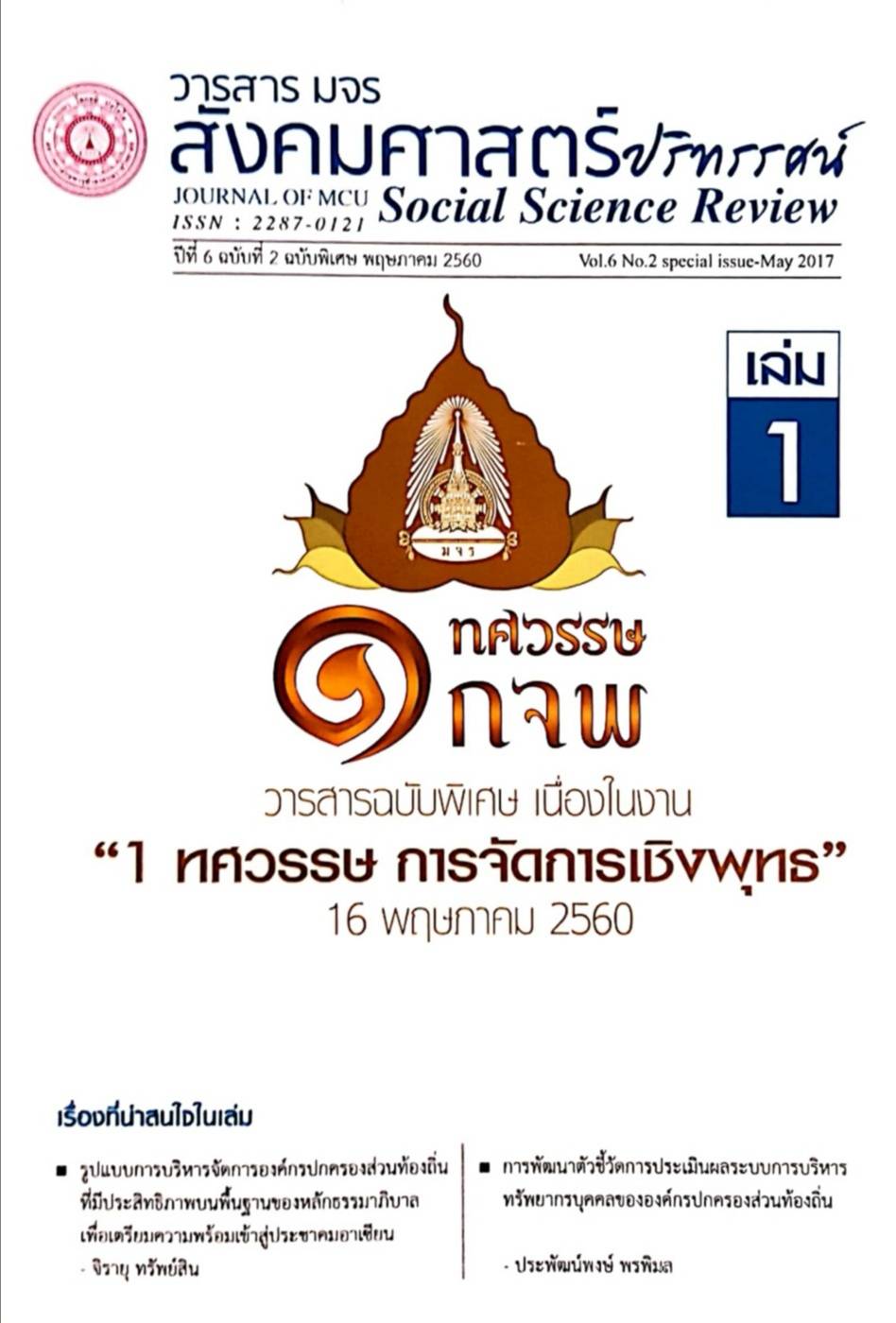การพัฒนาภาวะผู้น้าแบบผู้รับใช้ในการด้าเนินงานของผู้บริหารธุรกิจน้ามันหล่อลื่น ในประเทศไทย
คำสำคัญ:
การพัฒนา, ภาวะผู้นาแบบผู้รับใช้, ธุรกิจน้ามันหล่อลื่นบทคัดย่อ
การวิจัยครั้งนี้มีวัตถุประสงค์ (1) เพื่อศึกษาระดับความคิดเห็นภาวะผู้นาแบบผู้รับใช้ การ
มีส่วนร่วมในการทางาน ความผูกพันในองค์กร ความพึงพอใจการทางาน ในการดาเนินงานของผู้
บริหารธุรกิจน้ามันหล่อลื่น ในประเทศไทย (2) เพื่อศึกษาความสัมพันธ์ระหว่างภาวะผู้นาแบบผู้รับ
ใช้ การมีส่วนร่วมในการทางาน ความผูกพันในองค์กรความพึงพอใจการทางาน ของผู้บริหาร ธุรกิจ
น้ามันหล่อลื่น ในประเทศไทย (3) เพื่อเสนอแนวทางการพัฒนาภาวะผู้นาแบบผู้รับใช้ในการ
ดาเนินงานของผู้บริหารธุรกิจน้ามันหล่อลื่น ในประเทศไทย
ผู้วิจัยใช้กรอบแนวคิดและทฤษฎีในการศึกษา คือ ภาวะผู้นาแบบผู้รับใช้ การมีส่วนร่วม
ในการทางาน ความผูกพันในองค์กร และความพึงพอใจเป็นการวิจัยเชิงแบบผสมผสานระหว่างการ
วิจัยเชิงปริมาณ (Quantitative research) และการวิจัยเชิงคุณภาพ (Qualitative research) ส่วน
เครื่องมือที่ใช้ในการเก็บข้อมูลได้แก่ แบบสอบถาม จากกลุ่มตัวอย่าง ได้แก่ พนักงานที่ทางานใน
กลุ่มธุรกิจน้ามันหล่อลื่นในประเทศไทย จานวน 400 คน และแบบสัมภาษณ์ผู้บริหารในกลุ่มบริษัท
น้ามันหล่อลื่น ในประเทศไทย จานวน 10 ราย วิเคราะห์ข้อมูลด้วยโปรแกรมทางคอมพิวเตอร์
สาเร็จรูป ด้วยสถิติเชิงพรรณนา (Descriptive Statistics) วิเคราะห์รายละเอียดทั้งตัวแปรต้น ตัว
แปรแทรก ตัวแปรตาม ที่มีความสัมพันธ์ตามข้อสมมติฐานของการวิจัย โดยการวิเคราะห์ Path
analysis สัมประสิทธิ์สหสัมพันธ์เพียรสัน (Pearson correlation) Exploratory Factor Analysis
ผลการวิจัยพบว่า
1) องค์ประกอบภาวะผู้นาแบบผู้รับใช้ การมีส่วนร่วมในการทางาน ความผูกพันใน
องค์กร ความพึงพอใจการทางาน พบว่า ด้านการรับฟังผู้อื่น มีระดับความคิดเห็นมากที่สุด คือ
ผู้บริหารรับฟังข้อชี้แนะและข้อคิดเห็นต่างๆ จากผู้ร่วมงาน รองลองมาคือความพึงพอใจในการ
ทางาน ด้านความสาเร็จของงาน ภูมิใจในผลงานที่ท่านทาสาเร็จ และรู้สึกว่างานที่ท่านทามี
ความสาคัญต่อองค์กร ส่วนการมีส่วนร่วมในการทางาน ด้านการประเมิน คือมีส่วนร่วมในการแสดง
ความคิดเห็นในการทางานและรับทราบผลงานในการปฏิบัติงาน
2) ความสัมพันธ์ระหว่างภาวะผู้นาแบบผู้รับใช้ การมีส่วนร่วมในการทางาน ความผูกพัน
ในองค์กร ความพึงพอใจการทางาน พบว่า มีความสัมพันธ์กันอย่างมีนัยสาคัญทางสถิติที่ .01
เนื่องจากผลการวิเคราะห์ที่ได้มีค่าเข้าใกล้ 1 ทุกตัวแปร
3) การนาเสนอแนวทางการพัฒนาภาวะผู้นาแบบผู้รับใช้ในการดาเนินงานของผู้
บริหารธุรกิจน้ามันหล่อลื่น ในประเทศไทย ภาวะผู้นาแบบผู้รับใช้ คือด้านการมองการณ์ไกล ด้าน
การมีความรู้สึกร่วม ด้านการสร้างชุมชน ด้านการมุ่งมั่นพัฒนาบุคคล ด้านการสร้างกระบวนทัศน์
ด้านการรับผิดชอบดูแล ด้านการตระหนักรู้ ด้านการรับฟังผู้อื่น ด้านการเยียวยารักษา ด้านการโน้ม
น้าวใจ
เอกสารอ้างอิง
สัมฤทธิ์ การเพ็ง และสรายุทธ์ กันหลง. (25537. ภาวะผู้นาใฝ่บริการในองค์การ แนวคิด หลักการ
ทฤษฎีและงานวิจัย. พิมพ์ครั้งที่ 2. ขอนแก่น: โรงพิมพ์คลังนานาวิทยา.
ศิวพร โปรยานนท์. (2554). พฤติกรรมของผู้นาและสภาพแวดล้อมการทางานที่ส่งผลต่อความ
สร้างสรรค์ในงานของบุคลากร: กรณีศึกษาองค์การธุรกิจไทยที่มีนวัตกรรมยอดเยี่ยมปี
2552. วิทยานิพนธ์ปริญญามหาบัณฑิต. สาขาการพัฒนาทรัพยากรมนุษย์และองค์กร:
สถาบันบัณฑิตพัฒนบริหารศาสตร์.
Avolio , B.J. (1999). Full Leadership Development. California: SAGE.
Arnstien, S.R. (1969). A Ladder of Citizen Participation. Journal of the American
Institute of Planners.
Allen, N.J. and Meyer, J.P. (1990). Organizational commitment: Evidence of career
stage effects. In Journal of Business Research.
Block, P. (2009). Community: The structure of Belonging. San Francisco: Barrett
Koehler Publisher.
Daft Richard L. (1999). Leadership theory and practice. Forth Worth; TX: The Dryden
press.
Dierendonck, D. and Nuijten, I. (2011). The Servant Leadership Survey: Development
and Validation of A Multidimensional Measure. In Journal of Business and
Psychology.
Dubrin Abdrew J. (2007). Leadership: Research findings, Practice, and skills. Bosto.,
MA: Houghton Mifflin Company.
Jones, D. (2012). Does servant leadership lead to greater customer focus and
employee satisfaction?. Massachusetts: Hayward University Press.
Robin, S. (2012). The Truth about Managing People. 3rd Edition. New Jersey: FT
Press. Upper Saddle River.
Yukl, G.A. (2009). Leadership in Organization. 8th Edition. New York: Prentice Hall.
ดาวน์โหลด
เผยแพร่แล้ว
รูปแบบการอ้างอิง
ฉบับ
ประเภทบทความ
สัญญาอนุญาต
ลิขสิทธิ์ (c) 2020 วารสาร มจร สังคมศาสตร์ปริทรรศน์

อนุญาตภายใต้เงื่อนไข Creative Commons Attribution-NonCommercial-NoDerivatives 4.0 International License.
เพื่อให้เป็นไปตามกฎหมายลิขสิทธิ์ ผู้นิพนธ์ทุกท่านต้องลงลายมือชื่อในแบบฟอร์มใบมอบลิขสิทธิ์บทความให้แก่วารสารฯ พร้อมกับบทความต้นฉบับที่ได้แก้ไขครั้งสุดท้าย นอกจากนี้ ผู้นิพนธ์ทุกท่านต้องยืนยันว่าบทความต้นฉบับที่ส่งมาตีพิมพ์นั้น ได้ส่งมาตีพิมพ์เฉพาะในวารสาร มจร สังคมศาสตร์ปริทรรศน์ เพียงแห่งเดียวเท่านั้น หากมีการใช้ภาพหรือตารางหรือเนื้อหาอื่นๆ ของผู้นิพนธ์อื่นที่ปรากฏในสิ่งตีพิมพ์อื่นมาแล้ว ผู้นิพนธ์ต้องขออนุญาตเจ้าของลิขสิทธิ์ก่อน พร้อมทั้งแสดงหนังสือที่ได้รับการยินยอมต่อบรรณาธิการ ก่อนที่บทความจะได้รับการตีพิมพ์ หากไม่เป็นไปตามข้อกำหนดเบื้องต้น ทางวารสารจะถอดบทความของท่านออกโดยไม่มีข้อยกเว้นใดๆ ทั้งสิ้น





